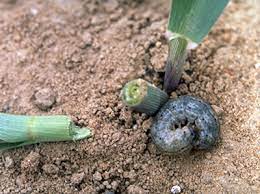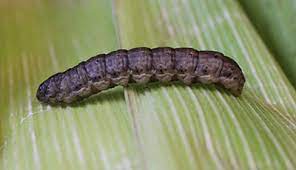By Brayden Evans
AgVenture Product Marketing Intern

A large black cutworm larvae curled in the c-shape next to a recently cut plant. Sometime larvae will pull the cutting into a hole and feed further. Photo: W.M. Hantsbarger, Bugwood.org.
Throughout the Midwest, spring has been slow with several cold and rainy days. This has made it harder for farmers across the country to get their crops planted. The delayed planting season makes it easier for pests like black cutworm to invade.
Black cutworm, the most damaging cutworm species in corn, is a migratory pest that shows up in the spring with storms. Moths overwinter in the south around Texas and Mexico and migrate north to lay eggs in crop fields allowing larvae to feed on corn seedlings. Weedy areas of fields will give the best indication if BCW populations are present because the moths tend to be attracted to green vegetation to lay eggs. As the larvae hatch, they feed on corn leaves and can cut corn until stage V5, when the plant has become larger. BCW larvae go through six to nine stages of growth. They first feed on leaves until they reach the fourth stage, where they are large enough to cut corn plants. The delay in planting has given black cutworm more time to establish and feed. Scouting should be done to ensure a good stand establishment has occurred in your fields.
Iowa State University has set predicted black cutworm cutting dates for across the state. They encourage people to begin scouting just before this date to look for insect larvae and any feeding present. You should examine 50 corn plants in five different areas of the field to get a representative sample of BCW populations. When looking at seedlings you should look for damaged or discolored plants, along with plants that appear to be cut. If larvae feeding is suspected, dig in the soil around the plants to look for black cutworms. Talk to your local AgVenture Yield Specialist to see if the insect threshold is met. They can help you find the best insecticide possible to help control BCW and maintain your yield potential.
Many different seed treatment options are available to help prevent black cutworms and other insects from damaging corn seedlings. AgVenture offers products including Qrome® and other trait packages featuring Herculex® insect protection that are great options for protecting your corn crop from several insects including black cutworm, rootworm, fall armyworm, and corn borers. AgVenture brand Qrome products have dual modes of action allowing corn to be protected below and above ground against harmful pests. Herculex XTRA is the most complete corn trait option for non-Roundup Ready® acres, providing season-long protection from a broad spectrum of corn insects. To find the best product for your acres, consult your AgVenture Yield Specialist.
Click to find your local AgVenture Independent Seed Company
Photos From: https://www.canr.msu.edu/news/black_cutworms_snip_sweet_corn_seedlings_early_in_the_season
https://crops.extension.iastate.edu/cropnews/2015/05/black-cutworm-scouting-2015
